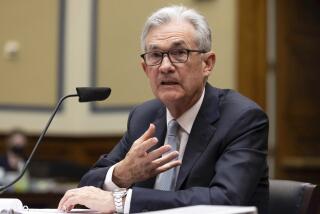Euro Came In Like a Lion, but Roar Is Fading
PARIS — The euro, the money that is supposed to power Western Europe’s economies like a mighty locomotive, has been looking in its short lifetime more like a caboose.
Since the currency shared by 11 member nations of the European Union entered the global marketplace Jan. 4, it has lost value almost steadily and is now worth nearly 6% less against the U.S. dollar.
Is this simply teething pains for a new and still virtual form of money that won’t exist in cash form until 2002, or is it one more harbinger of European recession? Although Western Europe’s economies are slowing--and Germany’s actually shrinking--specialists disagree on what’s to come.
Ed Yardeni, chief economist and global investment strategist at Deutsche Bank Securities Inc. in New York, counts himself among the Cassandras.
“I think by the end of the year, Europe’s economies will be dead in the water,” Yardeni predicted in an interview. “And I think that by next year, in part because of the year 2000 [computer] problem, Europe will be pushed into outright recession.”
If the U.S. economist is correct, that could have dire consequences for the euro, an ambitious experiment that has been hawked by European leaders to their voters as a growth elixir and a cure for unemployment.
Weakened Euro Can Affect U.S. Economy
A weak euro means that Europe can’t afford to buy as many American goods, a critical issue these days because a healthy Europe--the only other part of the world that’s economically strong--has helped to buoy the U.S. economy.
Longer-term, however, a weak euro would help ensure the preeminent role of the dollar in the world economy. Yet it also would signal that Europe’s effort to grow as a single, dynamic economy--a plus for all its trading partners--was foundering.
At the end of last week in London, the world’s premier currency exchange, one euro fetched $1.099, down from $1.168 at the beginning of the year. In New York, the euro was quoted at $1.1025.
German leaders warned last week that unless the European Union agrees on how to reduce farm subsidies and aid to poor regions--something it failed to do at a meeting Friday--the infant currency will become even shakier.
“If we don’t arrive at a solution, investors will tell themselves there is no community of views behind the euro, and the euro will plunge,” a high-ranking German official told Agence France-Presse.
Yardeni admitted, however, that there are other ways to read the tea leaves, and he is surprised himself at how well Europe has weathered the economic crises in Asia and Russia.
In Paris last week, he went to Bon Marche, a pricey department store on the Left Bank, to purchase a beret for his daughter in New York. He walked into such crowds of free-spending shoppers, he recalled with a chuckle, “I almost got run over.”
Drop in Value Normal, EU Officials Say
Meanwhile, officials in charge of the euro’s birth and upbringing have been assuring the 290 million people in the 11 “Euroland” countries that nothing is amiss.
The European Union’s commissioner for monetary affairs, Yves-Thibault de Silguy, told the German weekly newspaper Welt am Sonntag that the initial drop in the currency’s exchange value was nothing but “normal correction after the rapid appreciation of European currencies in the wake of last summer’s Russia crisis.”
“There is no sign of a lack of confidence of international investors in the euro,” De Silguy maintained. “Europe’s economic fundamentals are stable. . . . We have no inflationary tendencies in the euro zone but, on the contrary, solid confidence of investors, strong competition between enterprises and a high return on investments.”
Officials of the European Central Bank, or ECB, Euroland’s equivalent of the U.S. Federal Reserve, also are unflappable. President Wim Duisenberg called the euro’s drop “temporary.” He named two causes: robustness of the U.S. economy, now predicted to grow faster than Europe’s, and political pressures for a further cut in European interest rates, already at a postwar low.
Oskar Lafontaine, Germany’s powerful finance minister, has been leading the charge for an ECB-ordered reduction in interest rates so consumers in his country will borrow and spend more, reviving growth. Germany’s economy, the largest of the 11 euro nations’, shrank 0.4% in the fourth quarter of 1998, the first quarterly drop in three years, according to the Munich-based Ifo economic institute.
There may be worse to come, Ifo reported: German companies remain “pessimistic about the future” and plan “to cut production in coming months.”
On Feb. 19, economists at the Organization for Economic Cooperation and Development in Paris downgraded their predictions for European Union economic growth as a whole: from 2.2% to less than 2% this year. The U.S. economy, the OECD said, should develop faster over the same period, by 2.5% to 3%.
Yet when it comes to statistics, there are encouraging data for the Europeans along with the gloomy data. France, for example, announced Friday that its economy in 1998 grew at the fastest rate in nine years. So forecasters have a lot to disagree about.
Analysts See No Danger of Recession
An added complication is the euro’s newness.
“The euro is still finding its way and its right place in the world’s financial markets,” said Guillaume McLaughlin, policy analyst at the European Policy Center, a Brussels think tank.
As for the dip in the currency’s exchange value in its nearly two-month life span, McLaughlin said, “it’s still too early to say whether it’s got anything to do with Europe’s economic health.”
He added: “The fact is, the economies of Europe are working well, and there is no danger of a recession.”
A big plus for Europe is its trade surplus versus a chronic deficit for the United States that may hit $300 billion this year. A weaker euro will boost European exports even more because goods from Portuguese sparkling wine to Finnish newsprint will cost less in foreign markets.
In Euroland, consumer confidence indexes also are rising.
Graham Bishop, advisor on European financial affairs at the London offices of Salomon Smith Barney, is sanguine about both the new currency and the Old World’s economic future. The euro’s slide, the British investment banker predicted, is a “temporary blip,” though he acknowledged that he is puzzled as to the exact causes.
Investors, Bishop reported, have shown great confidence in Euroland and its new money: Thirty-year bonds denominated in euros and issued by the governments of France and Germany are finding buyers ready to accept 4.8% interest, or less than the 5.6% carried by comparable U.S. Treasuries.
What’s more, Bishop said, in the first month of the euro’s existence, the government bond market in Euroland nations totaled 2.255 trillion euros, or $2.49 trillion, 23% more than the market for comparable U.S. government bonds valid for at least a year and carrying fixed interest rates.
Other Europe-based economists say demand for euro-denominated bonds is not as great as they had predicted. There also is little sign that foreign central banks have begun trading dollar reserves for euros, which would be proof that the European upstart is considered internationally as trustworthy as the greenback.
Europeans Are Simply ‘Getting On With It’
However, McLaughlin, the Brussels analyst, said that is a long-term process that isn’t expected to be in full swing until five to 10 years from now.
In London, Bishop said Euroland bond markets already have become “a foundation in creating a reserve currency that investors and borrowers in the world will be willing to use as the basis of their financial activity.”
“The reality in Europe,” Bishop said, “is that we are getting on with it.”
More to Read
Sign up for Essential California
The most important California stories and recommendations in your inbox every morning.
You may occasionally receive promotional content from the Los Angeles Times.










